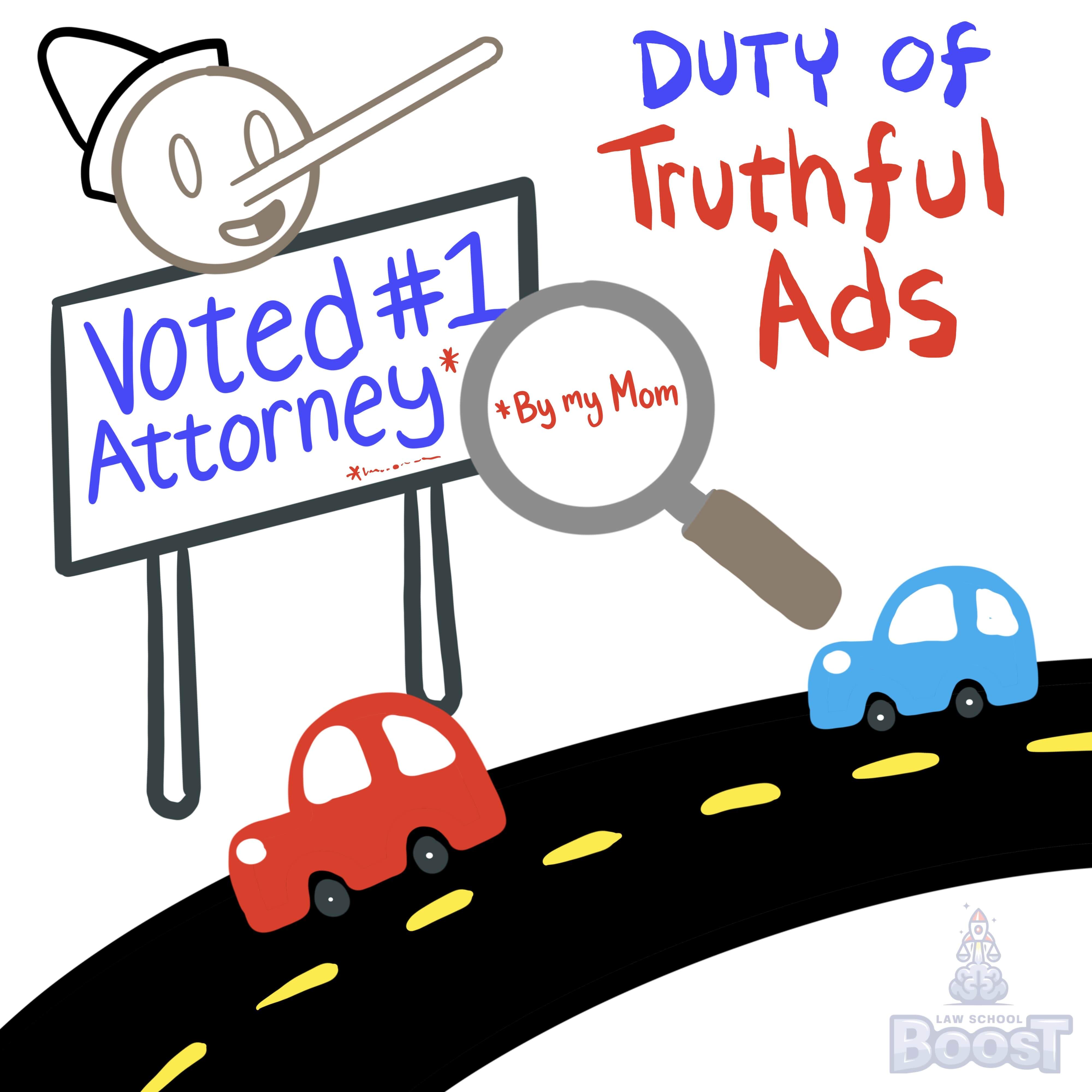‼️
Prof Responsibility • Advertising and Solicitations
PR#004
Legal Definition
A lawyer may advertise their services through written, recorded, or electronic communication, including public media, as long as the advertisement complies with Rule 7.1, which requires that all communications be truthful and not misleading. An advertisement is considered misleading if it contains a material misrepresentation of law or fact or omits information necessary to make the communication as a whole not misleading. Additionally, Rule 7.2 specifies that advertisements must include the name and office address of at least one lawyer responsible for its content. Promises or guarantees of outcomes that cannot be substantiated are prohibited to avoid creating unjustified expectations.
Plain English Explanation
Just like how a car dealership can't claim their cars never break down, lawyers can't lie or make promises about winning cases or guaranteeing specific results. This rule exists to protect people who might be in a vulnerable position when they need legal help. It ensures that when you're looking for a lawyer, you can trust the information you're seeing in their ads. The duty also requires lawyers to put their name and address on their ads. This is like putting a return address on a letter – it makes sure there's accountability. If someone has a problem with the ad, they know who to contact.
Hypothetical
Hypo 1: Bob, a personal injury attorney, creates a TV commercial where he claims, "I've never lost a case! Hire me, and I guarantee you'll win millions!" Sam sees the ad and hires Bob for his car accident case. When Sam only receives a small settlement, he feels misled by Bob's advertisement. Result: Bob has violated the Duty of Truthful Advertising. His claim of never losing a case is likely false or misleading, and guaranteeing millions in compensation creates unjustified expectations.
Hypo 2: Bob, a criminal defense lawyer, puts up a billboard that states, "Voted Best Lawyer in Town!" In small print at the bottom, it says, "By my mom." Sam hires Bob based on this advertisement but is disappointed with Bob's performance. Result: Bob has likely violated Rule 7.1. While the statement about being voted best lawyer is technically true, the omission of the fact that it was only his mother's opinion until the small print makes the advertisement misleading. The overall impression of the ad creates unjustified expectations about Bob's qualifications, which is prohibited under the rule.
Hypo 3: Bob, a divorce attorney, sends out mailers that state, "I've helped hundreds of clients get favorable divorce settlements. Call me for a free consultation." The mailer includes Bob's office address and contact information. Sam receives this mailer and decides to hire Bob. Result: This advertisement likely complies with Rule 7.1 and 7.2. Bob's claim about helping hundreds of clients is not inherently misleading if it's true. He doesn't guarantee outcomes but instead offers a factual statement about his experience. The mailer includes his contact information as required. This type of advertising is generally allowed under the rules.
Hypo 4: Bob, a tax attorney, publishes an article in a local newspaper about recent changes in tax law. The article is informative and doesn't make any claims about Bob's services. At the end, it simply states, "Bob Smith is a tax attorney at Smith Law Firm." Sam reads the article and decides to hire Bob for his tax issues. Result: This would not fall under the Duty of Truthful Advertising rule. The article is purely informational and doesn't constitute an advertisement for Bob's services. The simple statement of Bob's profession and firm at the end is just a factual attribution.
Hypo 2: Bob, a criminal defense lawyer, puts up a billboard that states, "Voted Best Lawyer in Town!" In small print at the bottom, it says, "By my mom." Sam hires Bob based on this advertisement but is disappointed with Bob's performance. Result: Bob has likely violated Rule 7.1. While the statement about being voted best lawyer is technically true, the omission of the fact that it was only his mother's opinion until the small print makes the advertisement misleading. The overall impression of the ad creates unjustified expectations about Bob's qualifications, which is prohibited under the rule.
Hypo 3: Bob, a divorce attorney, sends out mailers that state, "I've helped hundreds of clients get favorable divorce settlements. Call me for a free consultation." The mailer includes Bob's office address and contact information. Sam receives this mailer and decides to hire Bob. Result: This advertisement likely complies with Rule 7.1 and 7.2. Bob's claim about helping hundreds of clients is not inherently misleading if it's true. He doesn't guarantee outcomes but instead offers a factual statement about his experience. The mailer includes his contact information as required. This type of advertising is generally allowed under the rules.
Hypo 4: Bob, a tax attorney, publishes an article in a local newspaper about recent changes in tax law. The article is informative and doesn't make any claims about Bob's services. At the end, it simply states, "Bob Smith is a tax attorney at Smith Law Firm." Sam reads the article and decides to hire Bob for his tax issues. Result: This would not fall under the Duty of Truthful Advertising rule. The article is purely informational and doesn't constitute an advertisement for Bob's services. The simple statement of Bob's profession and firm at the end is just a factual attribution.
Visual Aids





